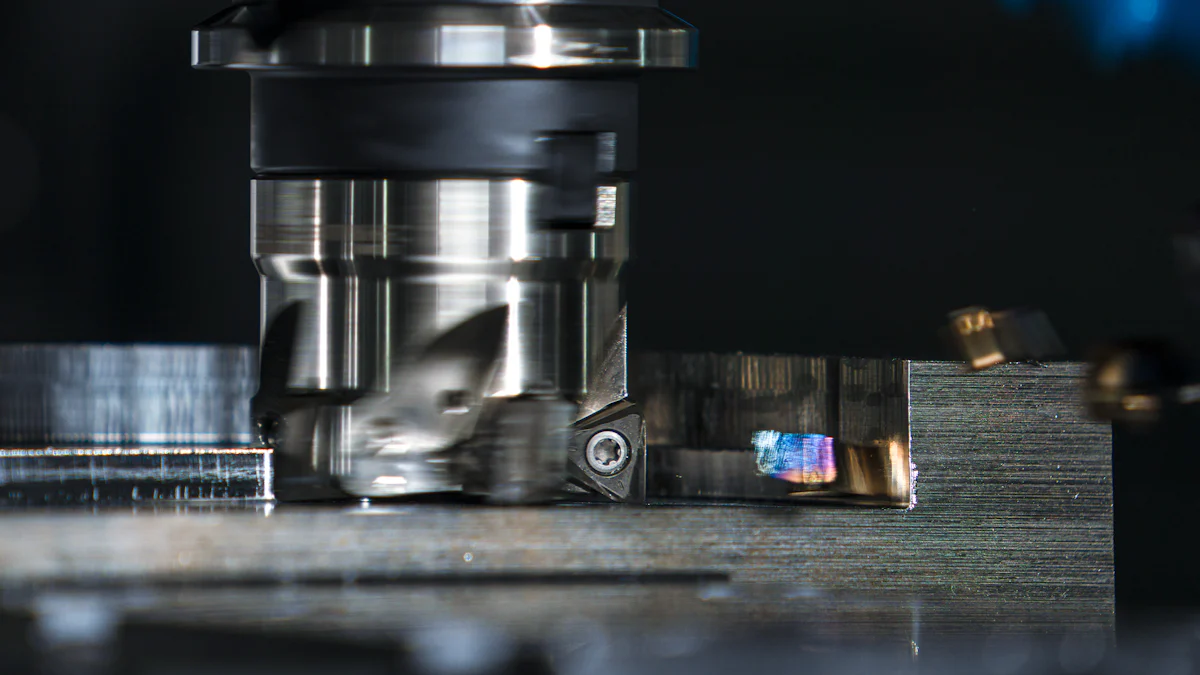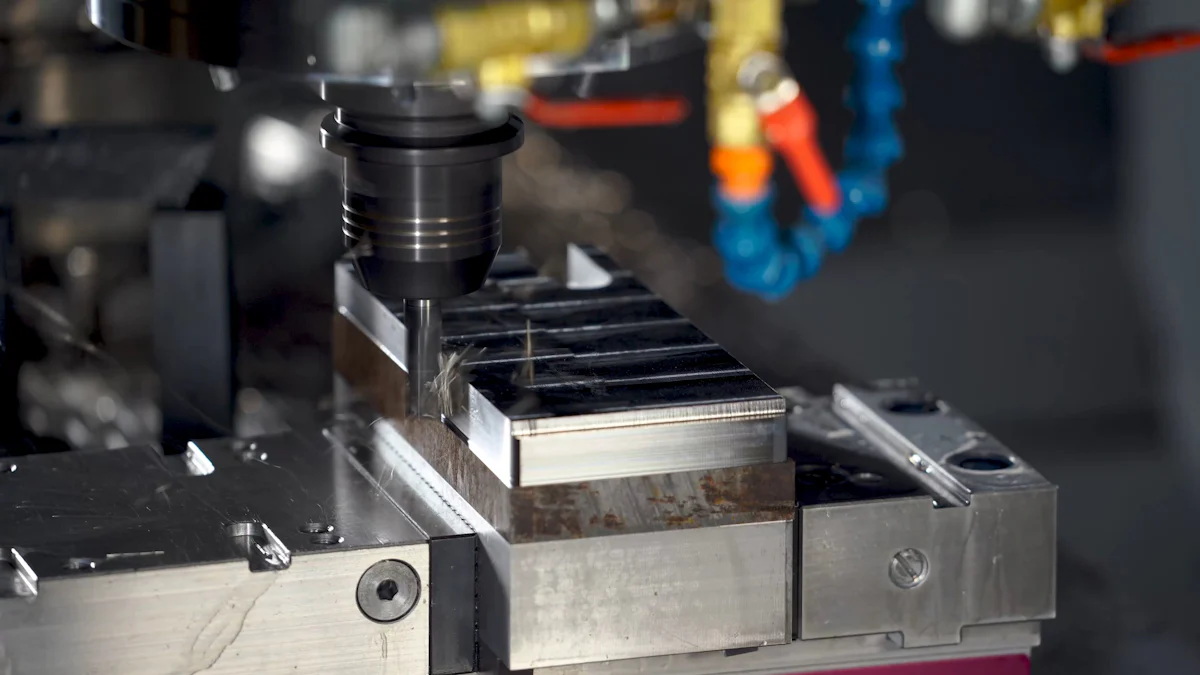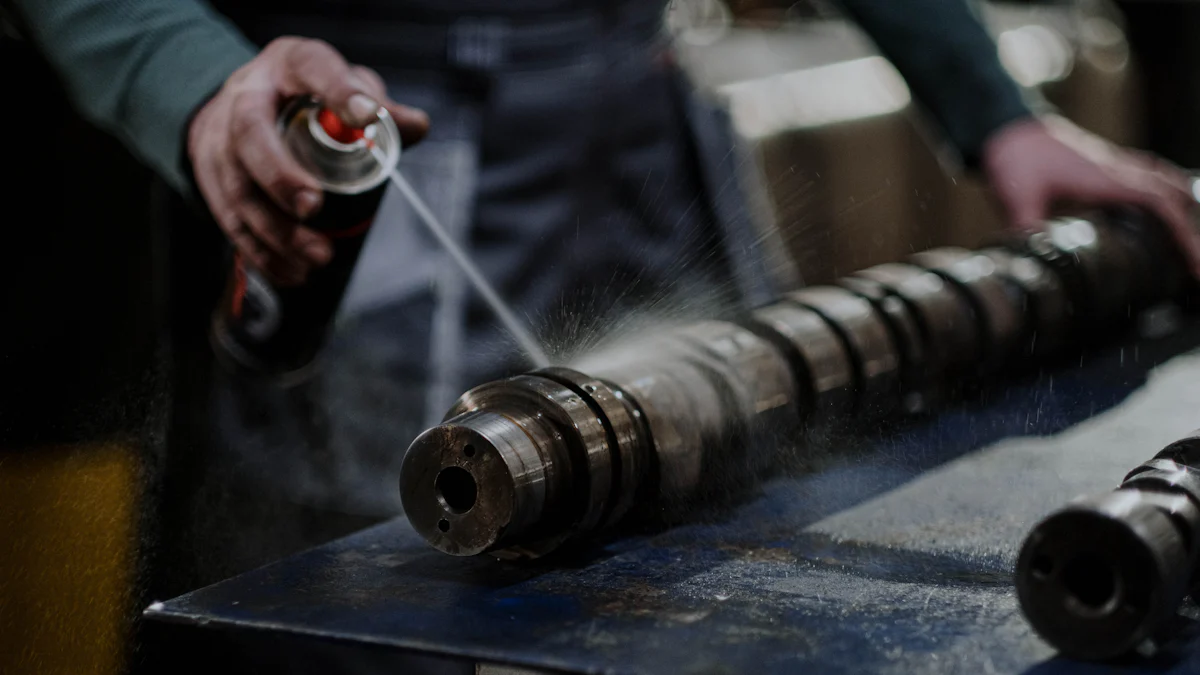How CNC Machining Reduces Labor Costs and Improves Productivity

CNC machining transforms the manufacturing process by automating tasks that once required extensive manual labor. You can achieve unmatched machining efficiency with this technology, as it combines precision, speed, and reliability. Unlike traditional methods, CNC machines execute operations with minimal downtime, drastically reducing production times. The importance of CNC machining lies in its ability to streamline workflows, eliminate human error, and enhance product quality. By automating repetitive tasks, you can focus on high-value activities while enjoying the benefits of CNC machining, such as reduced labor costs and consistent output.
Key Takeaways
CNC machines do tasks automatically, so less manual work is needed.
They are very precise, making products of the same high quality.
These machines run all the time, speeding up production and reducing delays.
They can quickly adjust to new designs, great for custom products.
Using CNC machines saves money over time by cutting training and waste.
Understanding CNC Machining

What Is CNC Machining?
CNC machining, short for computer numerical control machining, is a subtractive manufacturing process that transforms raw materials into finished products. You can achieve this by using pre-programmed software to control machinery such as mills, lathes, and routers. Unlike manual machining, CNC technology automates the entire process, ensuring precision and consistency in every operation.
The core mechanism of CNC machining involves six integrated components. These include input devices, a machine control unit (MCU), the machine tool, a driving mechanism, a feedback system, and a display unit. The MCU acts as the brain of the system, decoding instructions and generating motion commands. The driving mechanism positions the machine table with the help of motors and ball lead screws, while the feedback system monitors the cutting tool's position and speed. This seamless integration ensures high precision and accuracy, making CNC machining a reliable choice for complex manufacturing tasks.
Key Features of CNC Machining
Automation and Computer Control
Automation is at the heart of CNC technology. By relying on computer control, you can eliminate the need for manual intervention during machining. Once you input the design specifications, the machine executes the task with minimal supervision. This not only reduces labor costs but also enhances productivity by enabling continuous operation.
High Precision and Accuracy
CNC machining excels in delivering precision and accuracy. The pre-programmed software ensures that every cut, drill, or turn meets exact specifications. This level of precision is crucial in industries like aerospace, medical, and automotive, where even minor deviations can lead to significant issues. You can trust CNC technology to maintain precision and consistency across all production runs.
Versatility Across Applications
CNC machining is incredibly versatile, making it suitable for a wide range of industries. Whether you're in aerospace, electronics, or jewelry manufacturing, CNC technology adapts to your needs. Its ability to handle complex designs and various materials ensures that you can produce high-quality components regardless of your sector. This versatility makes CNC machining a cornerstone of modern manufacturing.
Tip: If you're looking to streamline your production process, CNC machining offers a perfect blend of automation, precision, and adaptability.
Comparing CNC Machining to Manual Machining
Labor Requirements
Reduced Need for Skilled Operators
CNC machining significantly reduces the need for a large, highly skilled workforce. Its automation capabilities allow you to operate machines with fewer personnel. Unlike manual machining, which demands operators with excellent coordination and manual dexterity, CNC technology requires machinists to understand computer programming languages and CAM software. This shift in skill requirements streamlines operations and lowers labor costs, making CNC machining a more efficient choice for modern manufacturing.
Minimal Supervision
With CNC technology, you can minimize supervision during production. Once you program the machine, it executes tasks autonomously, requiring only occasional monitoring. This contrasts with manual machining, where operators must oversee every step of the process. By reducing the need for constant oversight, CNC machining enhances manufacturing efficiency and allows you to allocate resources to other critical areas.
Productivity Advantages
Continuous Operation (24/7)
CNC machines excel in productivity by operating continuously with minimal downtime. You can achieve faster turnaround times and higher throughput due to automation features like tool changers and robotic systems. These capabilities eliminate the need for manual intervention and setup, ensuring uninterrupted production and maximizing output.
Faster Production Speeds
CNC machining outperforms manual methods in speed. Its ability to execute complex operations quickly and accurately reduces production times. By leveraging CNC technology, you can meet tight deadlines and scale production without compromising quality. This advantage is crucial for industries that demand rapid manufacturing cycles.
Error Reduction
Elimination of Human Error
Manual machining is prone to errors such as improper tool usage, incorrect feed and speed settings, and programming mistakes. CNC machining eliminates these issues by automating processes and relying on pre-programmed instructions. This ensures consistent performance and reduces the risk of costly mistakes.
Consistent Quality
CNC machining guarantees consistent quality across large production runs. Machines achieve tolerances within microns, ensuring every part meets exact specifications. Automation eliminates variations caused by human factors, while real-time monitoring detects deviations early. This level of precision and uniformity enhances product reliability and strengthens your reputation in competitive markets.
How CNC Machining Achieves Reduced Labor Costs
Automation and Workforce Optimization
Fewer Operators Needed
CNC machining leverages automation to minimize the need for human operators. By automating repetitive tasks such as loading and unloading materials, you can reduce labor costs significantly. One operator can manage multiple machines simultaneously, maximizing efficiency and scalability. This approach not only reduces the workforce size but also enhances safety by limiting human interaction with hazardous machinery. Continuous operation without manual intervention ensures high-volume manufacturing with consistent quality, making CNC technology a cost-effective solution for modern industries.
Reallocation to High-Value Tasks
Automation in CNC machining allows you to reallocate your workforce to more skilled and valuable activities. Employees no longer need to focus on repetitive or physically demanding tasks. Instead, they can engage in process optimization, quality control, or advanced programming. This shift improves job satisfaction and enhances overall productivity. Additionally, the integration of advanced technologies like AI in CNC systems enables workers to focus on data-driven decision-making, further boosting cost-effectiveness and production efficiency.
Long-Term Cost Savings
Lower Training Costs
CNC technology simplifies operations, reducing the need for extensive training. Unlike manual machining, which requires operators to master complex techniques, CNC systems rely on pre-programmed instructions. This reduces the time and resources needed to train new employees. Over time, this contributes to significant cost savings, especially in industries that require high-volume manufacturing.
Reduced Downtime
CNC machining minimizes downtime through continuous operation and efficient maintenance practices. Machines can run 24/7, completing large orders faster than traditional methods. Proper maintenance prevents breakdowns, ensuring uninterrupted production. Additionally, CNC systems reduce setup times and improve cycle times, further enhancing production efficiency. These factors collectively reduce costs and improve the cost-effectiveness of your manufacturing processes.
Note: By adopting CNC machining, you can achieve reduced labor costs, long-term savings, and enhanced productivity, making it an essential tool for competitive industries.
How CNC Machining Delivers Improved Productivity

Faster Production Cycles
High-Speed Machining
CNC machining significantly accelerates production cycles by utilizing high-speed machining capabilities. Unlike manual methods, CNC machines operate continuously without breaks, ensuring faster turnaround times. These machines achieve higher cutting speeds and process multiple parts simultaneously, which enhances overall efficiency. This continuous operation minimizes downtime and allows you to meet tight deadlines without compromising quality. By leveraging CNC technology, you can optimize production and align projects with strict timelines.
Multi-Axis Operations
Multi-axis CNC machines further enhance production speed by enabling complex operations in a single setup. These machines allow for all milling and turning tasks to be completed simultaneously, reducing the need for multiple setups. This streamlined approach minimizes operational costs and eliminates errors commonly associated with traditional 3-axis machining. Multi-axis operations not only improve efficiency but also ensure consistent quality across all parts, making them ideal for high-precision industries.
Scalability and Flexibility
Adapting to Design Changes
CNC machining offers unmatched flexibility when adapting to frequent design changes. You can quickly reprogram machines to accommodate new specifications, reducing time and costs associated with retooling. This adaptability is particularly beneficial for industries requiring short-run productions or custom orders. Modern CNC technology also supports rapid prototyping, enabling you to create precise prototypes that reflect final product designs. This capability shortens product development cycles and ensures faster time-to-market.
Efficient Batch Production
CNC machining excels in both small and large batch production. For smaller runs, it bridges the gap between prototypes and full-scale manufacturing by producing 50 to 1,000 pieces efficiently. For larger runs exceeding 1,000 parts, CNC machines maintain consistent quality while reducing per-part costs. Continuous, repeatable operations increase output and require minimal oversight, ensuring uninterrupted production. This efficiency and scalability make CNC machining a cost-effective solution for varying order sizes.
Waste Reduction
Precision Cuts
CNC machining reduces material waste through precise cutting techniques. Advanced software optimizes cutting paths, ensuring minimal excess material removal. This precision not only lowers raw material costs but also reduces the environmental impact of production. By employing computer-controlled accuracy, CNC technology ensures efficient material usage, making it a sustainable choice for modern manufacturing.
Optimized Material Use
CNC machining further optimizes material use by incorporating advanced cutting methods like adaptive and laser cutting. These techniques maximize material utilization and minimize waste. Additionally, real-time monitoring detects and corrects issues promptly, ensuring consistent quality. By reducing material waste and energy consumption, CNC machining supports sustainable practices while enhancing overall efficiency.
Sustainability Tip: CNC machining helps preserve natural resources and reduces pollution, making it an environmentally friendly manufacturing option.
Cost Efficiency and ROI of CNC Machining
Balancing Initial Investment and Savings
Upfront Costs vs. Efficiency Gains
Investing in CNC machining requires a significant upfront cost. These machines, equipped with advanced automation and precision features, often cost more than manual alternatives. However, the long-term benefits far outweigh the initial expense. By automating repetitive tasks, CNC machining reduces labor costs and minimizes material waste. This efficiency leads to substantial savings over time.
While the initial investment in CNC machinery can be substantial, the long-term cost savings are significant. CNC machines reduce labor costs by minimizing the need for skilled operators. Additionally, the precision and consistency of CNC machining reduce material waste, leading to cost savings on raw materials.
You can also achieve consistent quality with CNC machining, which eliminates the need for rework and further enhances cost efficiency. These factors make CNC machining a smart investment for businesses aiming to optimize their manufacturing processes.
Faster Break-Even Point
CNC machining allows you to recover your initial investment faster. The automation capabilities enable continuous operation, increasing production output and reducing downtime. By producing high-quality products efficiently, you can meet market demands quickly and generate revenue sooner. This accelerated break-even point makes CNC machining a cost-effective solution for long-term profitability.
Competitive Edge
Faster Time-to-Market
CNC machining gives you a significant advantage in reducing lead times. The ability to quickly adapt to design changes and produce prototypes ensures faster product development cycles. This efficiency allows you to fulfill orders promptly and exceed customer expectations.
CNC machining significantly reduces lead times, allowing companies to fulfill orders faster.
Improved lead times enhance customer relationships by meeting or exceeding delivery expectations.
Faster production cycles lead to increased productivity, enabling teams to complete more tasks.
By halving lead times, you can double your production capacity, which directly impacts your revenue growth. This scalability ensures you remain competitive in fast-paced industries.
Enhanced Product Quality
CNC machining ensures exceptional product quality by achieving tight tolerances and consistent specifications. Unlike manual machining, which relies on human skill, CNC machines automate the process to deliver precise results every time.
CNC Machining | Manual Machining |
|---|---|
Achieves tolerances within microns | Limited by human skill and tools |
Consistent specifications | Variability in output |
Reduces waste and rework | Higher chances of errors |
This consistency reduces waste and eliminates defects, especially in mass production. By delivering high-quality products, you can strengthen your reputation and build trust with your customers.
CNC machining automates the manufacturing process, which minimizes human error. This automation allows for precise programming of machines to execute complex tasks that would be difficult for human machinists, resulting in components with exceptionally tight tolerances.
CNC machining has transformed modern manufacturing by combining automation, precision, and adaptability. You can reduce labor costs and improve productivity by leveraging its advanced features, such as high-speed machining and multi-axis operations. Manufacturers benefit from fewer errors, consistent quality, and the ability to handle complex designs with ease.
Why adopt CNC machining?
It minimizes material waste and labor costs, ensuring long-term savings.
Its precision supports industries like aerospace, automotive, and defense, where exacting tolerances are critical.
Integration with Industry 4.0 technologies enhances efficiency and scalability.
Future advancements, including AI-driven programming and remote monitoring, will further optimize CNC machining processes. These innovations will help you stay competitive in evolving markets while meeting increasing demands for precision and efficiency.
By adopting CNC machining, you position your business for sustained growth and profitability in a competitive landscape.
FAQ
What industries benefit the most from CNC machining services?
CNC machining services are widely used in aerospace, automotive, medical, and electronics industries. These sectors demand high levels of accuracy and precision, which CNC technology delivers consistently. Its versatility also makes it suitable for custom manufacturing and prototyping across various applications.
How does CNC machining ensure accuracy in production?
CNC machining achieves accuracy through pre-programmed software and automated processes. Machines follow precise instructions, eliminating human error. Advanced features like real-time monitoring and feedback systems further enhance accuracy, ensuring consistent results in every production cycle.
Can CNC machining services handle complex designs?
Yes, CNC machining services excel at handling intricate and complex designs. Multi-axis machines allow for detailed operations in a single setup. This capability ensures high accuracy and efficiency, making CNC technology ideal for producing components with tight tolerances and unique geometries.
Are CNC machining services cost-effective for small businesses?
CNC machining services offer cost-effective solutions for small businesses. Automation reduces labor costs, while accuracy minimizes material waste. Additionally, the ability to produce small batches efficiently makes CNC technology accessible for businesses with limited production needs.
What materials can CNC machining services process?
CNC machining services can process a wide range of materials, including metals, plastics, and composites. The technology's accuracy ensures precise cuts and finishes, regardless of the material. This flexibility makes CNC machining suitable for diverse manufacturing requirements.
See Also
Streamlined CNC Machining Solutions for Accurate Production
Impact of CNC Precision Parts on Production Expenses
CNC Machining Innovations Revolutionizing Precision Manufacturing Processes
Investigating CNC Machining Options for Precise Manufacturing
Enhancing Production Quality Through CNC Precision Machining
About US
Follow Us
Your prototype holds unparalleled significance, and we deeply value its uniqueness. Collaborating with you during the preparation phase for running your prototype or parts is a commitment we gladly embrace. Whether it's a single part or a complex assembly, we are dedicated to selecting the optimal tools and pathways to bring your envisioned product to life.
At Precision Fab CNC Machining, we specialize in producing parts for prototypes, short runs, and high-volume production. Our prototyping machine capabilities extend across metal, plastic, and wood machining, with welding fabrication services available to complement and finalize your prototype if required.
Address
Address: Room320 10F, Building A,Nanshan international building, Dayawan District, Huizhou, Guangdong, 516001 China
Contacts
billy@timaycnc.com

